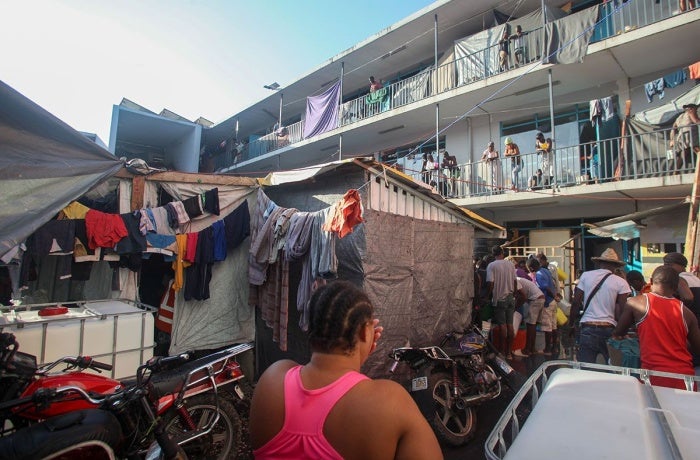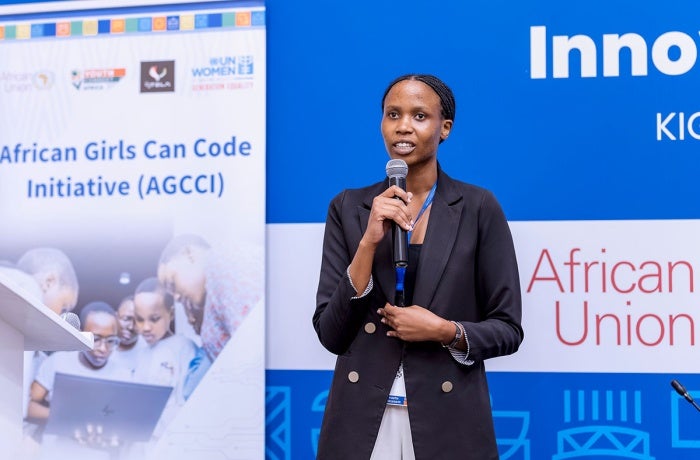Women are leading the humanitarian response in Sudan
Since the start of the ongoing conflict in Sudan, large numbers of women, children, the elderly and other vulnerable groups have been internally displaced, with significant cross-border movement to neighboring countries. 24.7 million people—about half the population of Sudan—are reported to need humanitarian aid and protection.
In response to the war, more than 49 women-led peace initiatives, humanitarian initiatives and civil society organizations have formed a network called the Peace for Sudan Platform. Supported by the UN Women Sudan office, Peace for Sudan includes representatives from across the different regions of the country, facilitating communication and catalysing collective women-led advocacy efforts.
Below, meet a few of the Sudanese women who are leading the humanitarian response and campaigning for an end to the conflict.
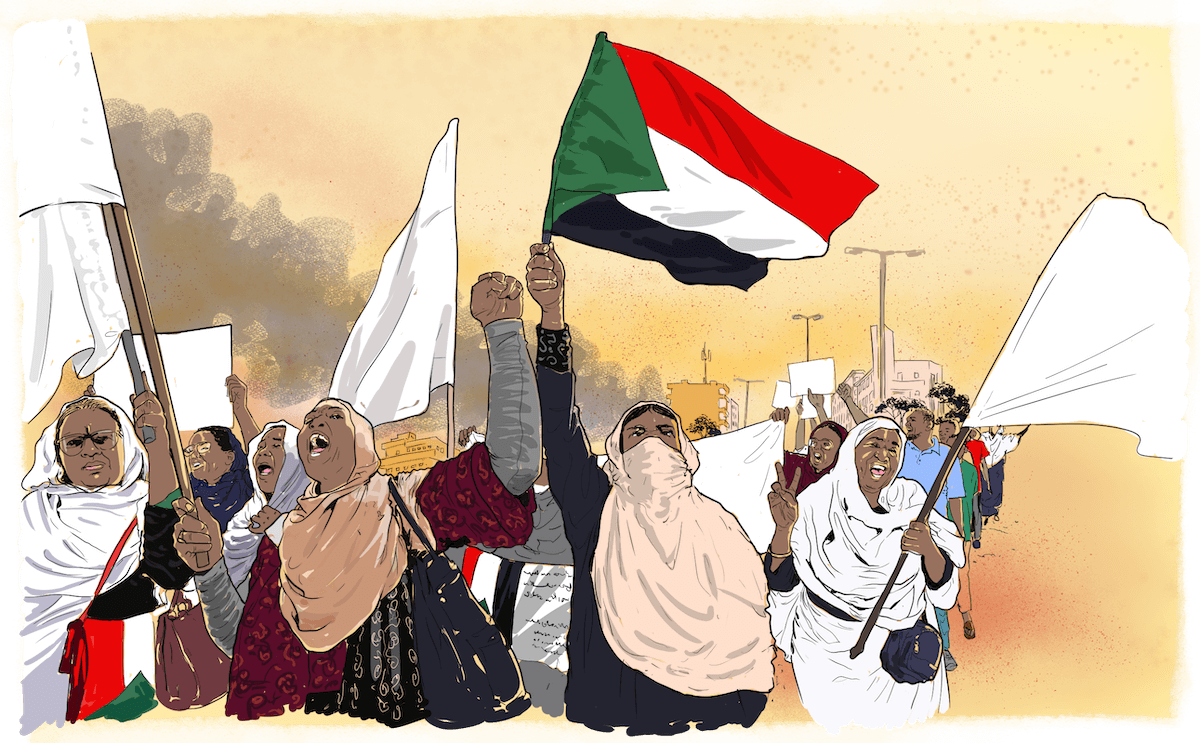
Astur*, Blue Nile State
Astur* is an advocate for women's rights and a writer. She is one of the founders of the Women's Awareness Initiative in the Blue Nile region, which promotes the active participation and leadership of women and girls and opposes gender-based violence. She is the president of the Blue Nile University Council and a member of various local and regional women's initiatives and networks. On 16 April 2023, she established the "Mothers of Sudan" campaign opposing the ongoing war in Sudan, and she organized the first women's protest against the war, held in Khartoum on 23 April.
The war has led to increased coordination among women's groups and the creation of strong solidarity among women across all Sudanese states. Several networks are working at different levels to end the war, such as the Women Against War network and the Mothers of Sudan campaign. These groups document violations, monitor the situation, advocate for peace, and exert pressure on the international community and other parties to support a resolution and achieve peace. They also provide support to affected families, offer shelter to the displaced, facilitate the evacuation of those trapped in Khartoum and provide medical services.
The Mothers of Sudan initiative mobilizes citizens to oppose the war, exert pressure on individuals and military leaders, and contribute to resilience strategies within the current crisis. The organization initially emerged as a strong advocate for peace, but quickly transitioned to conducting a comprehensive situation analysis. Recognizing the importance of engaging civil society, they actively sought ways to involve them in the progress towards resolving the situation. In addition to their analysis, they have devoted efforts to creating diverse strategies for various involvements, while also providing vital psychosocial support for survivors.
The Mothers of Sudan group has now evolved into a platform primarily focused on sharing information. Given the urgency and severity of the circumstances, their primary goal has shifted to saving lives, making it challenging for them to fully reorganize and operate at their maximum capacity. Nonetheless, their commitment to their cause remains unwavering as they strive to make a difference in the lives of those affected.
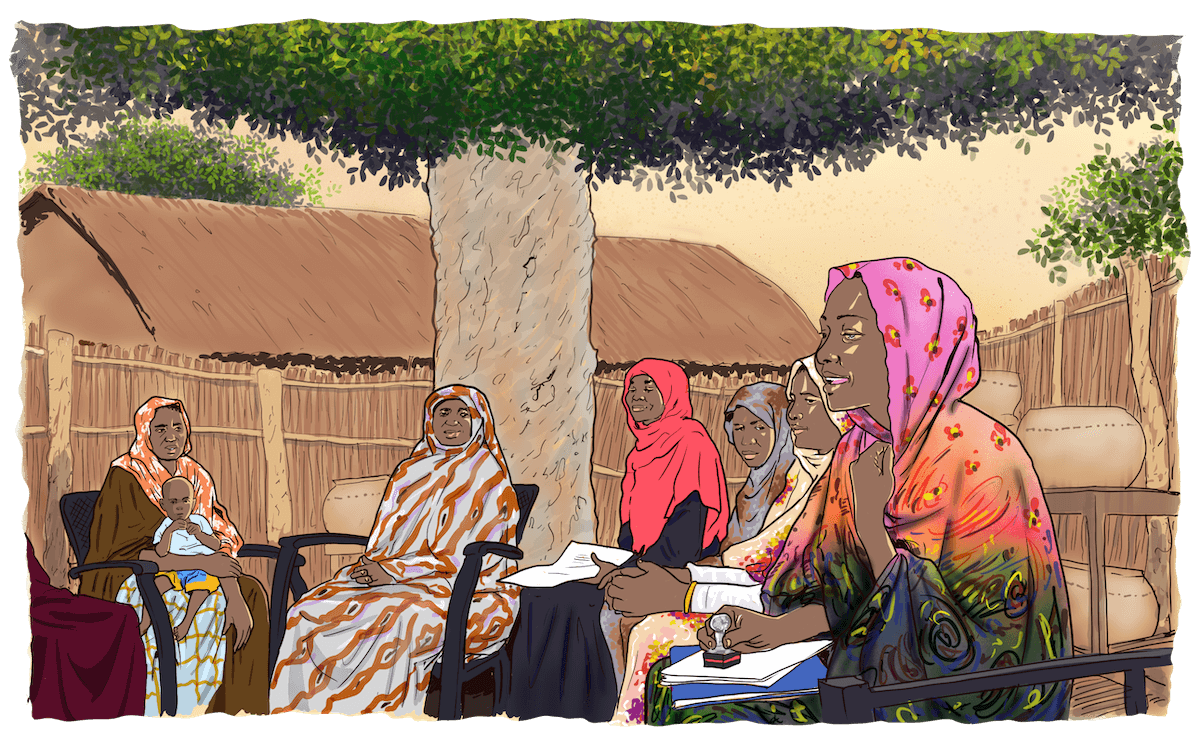
Aliya*, Kordofan State
Aliya* has worked in the humanitarian and development fields for more than fifteen years, focusing on economic empowerment, peacebuilding, water, sanitation and hygiene, and protection interventions. She works with children and survivors of gender-based violence in South Kordofan and North Darfur, as well as with internally displaced persons (IDPs), refugees, returnees and host communities.
Northern Kordofan is one of the areas most affected by the conflict, as it houses a military airport and serves as a strategic reserve for the Sudanese army. The well-known airport, Al-Abiad, has been destroyed, as has the Social Security Hospital, the region’s largest and highest-quality healthcare facility that provides global-standard services. Additionally, the large market has been subject to looting, arson, and road blockades, resulting in the disruption of public movement.
Southern and western Kordofan states did not witness direct conflict; however, they have been affected by road blockades and a scarcity of food, fuel, and clean water, leading to the disruption of essential institutions and banking services. Women have not been spared from security threats and violence; they have been forcibly used to gather information, and some women have been abducted in front of their helpless families due to the overwhelming power of the armed forces and the absence of any impartial authority. These security and economic tensions have limited the work of women's groups, which have resorted to limited coordination through WhatsApp groups despite the weak mobile communication networks.
We are the Women of the Nuba Mountains Initiative/South Kordofan, which is part of the Mothers of Sudan initiative and the Peace for Sudan platform. We are a group of women's organizations, networks, activists, and social and legal platforms representing all states in Sudan. Under the slogan "No to War", we call for an immediate and permanent cessation of the war.
We are collaborating with displaced and affected families to provide assistance in the form of shelter, food, medical and healthcare supplies, and psychological support. We are also collecting information about the conditions of women in conflict and displacement areas and submitting reports to assist them. And we are coordinating women's initiatives to improve the situation of women and girls, and coordinating the hosting of displaced families, especially in the absence of open camps or shelter centers other than schools.
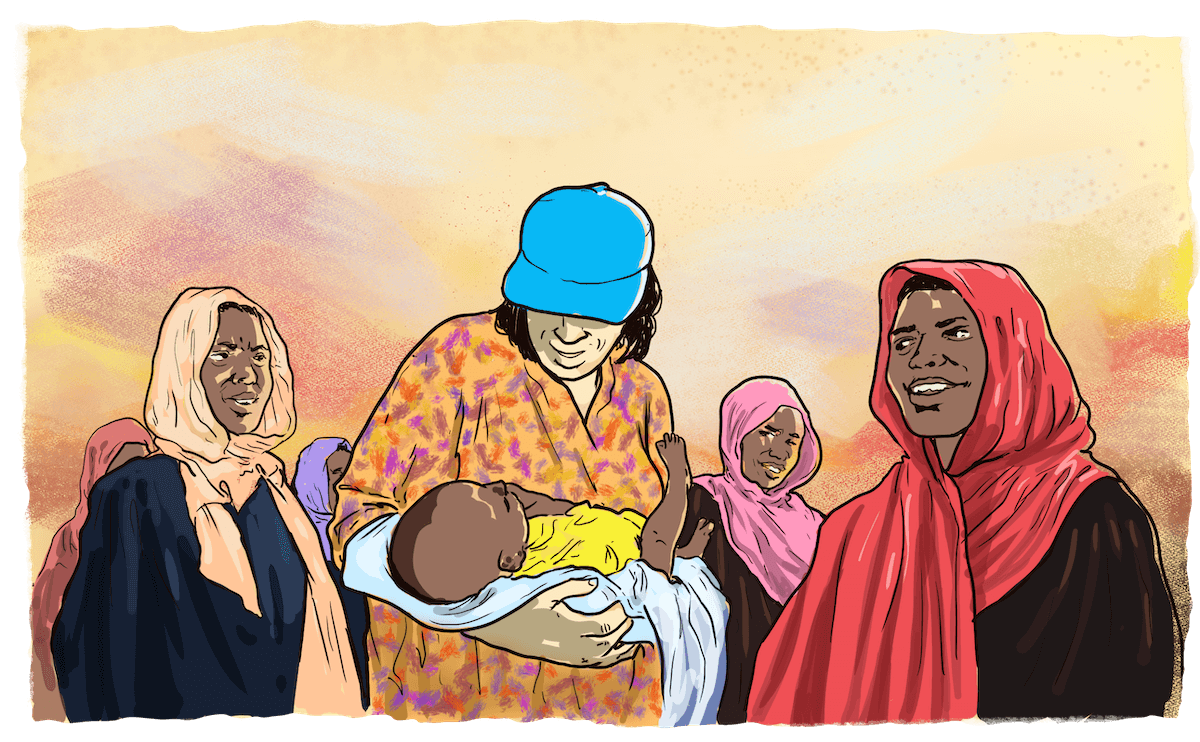
Barkhado*, Khartoum State
Barkhado* is a Sudanese activist with a master's degree in peace and development. She is interested in youth political participation, human rights and peacebuilding, serving as a 2023 UN youth delegate and a delegate at the Global Peace Chain. She worked on the Project for Supporting Democratic Transition in Sudan and served as a coordinator for the Transitional Justice Project with "Open Up”, as well as running the International Relations Office at the Institute of Judicial and Legal Sciences.
The ongoing conflict situation in Sudan, especially in Khartoum and West Darfur (El Geneina), has resulted in widespread destruction of infrastructure and the collapse of social and political systems. This has led to the killing of civilians, the rape of women, and an exacerbation of the situation in affected areas. Women and girls have been subjected to various forms of violence, with lasting effects They lack access to basic services like water, and face challenges in accessing healthcare and economic support. Violations against women have been committed by people wearing military uniforms. There have been alarming reports of sexual assaults against women. Unfortunately, due to challenging circumstances, comprehensive medical support cannot be fully provided to the affected women. According to reports from the Anti-Violence Protection Unit, 11 cases of violence against women have been registered in various areas of Khartoum.
Women's organizations play a vital role in providing shelter, food, water, healthcare, and psychological support, and in monitoring violations and raising awareness to stop the war. They can contribute to peacebuilding by participating in negotiations and encouraging dialogue among the warring parties, promoting peaceful solutions to conflicts in Sudan.
The “Peace for Sudan” platform was formed, focusing on women's initiatives in various states to address the current situation. The network's priorities include promoting dialogue between warring parties, encouraging peaceful solutions, and providing essential support such as shelter, food, water, sanitation, healthcare and education for women and girls affected by the war. The network also empowers women to raise their voices and work with their communities to halt the war and stop violations against women. In addition, the network aims to enhance collaboration among different women's organizations and knowledge sharing.
The community can support these priorities through various means, including by encouraging local organizations and facilitating collaboration and coordination. Additionally, the community can provide support to women and girls affected by the war, and support efforts to find a peaceful solution to the conflict.
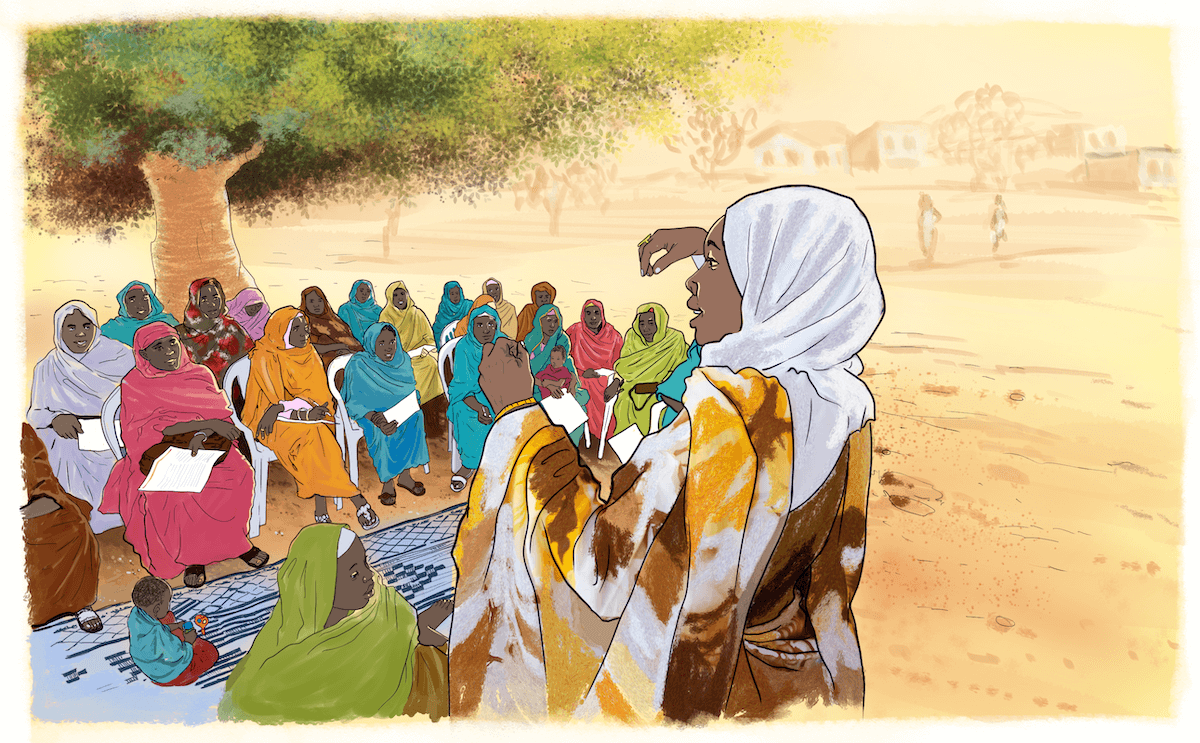
Axado*, Northern State
Axado* is a women’s rights activist and peace advocate. She is an active member of various women-led groups and other initiatives working against the ongoing war in Sudan, focusing on peace advocacy, service provision to IDPs and capacity building. The highest number of displaced families has been reported in the Northern State, where she resides.
The situation in the Northern State is relatively safe. There is no active conflict in the state. However, there are many displaced people, which has led to a significant deterioration in services and infrastructure and a shortage of life-saving medicines. Houses within the state may not be good living conditions for the IDPs as they lack necessities.
Unfortunately, in the Northern State, women did not participate in political processes prior to 2018. After the Sudanese revolution, a group of young women played a key role in enhancing women's political participation and raising their awareness of political processes.
Currently, many women cannot make the decisions about their own lives, whether to flee and seek asylum or stay, and they are not allowed to participate in gatherings outside their homes. Women activists are now engaged in providing housing, food, medicine, transportation for the displaced, and psychological support and health services. They are also working to raise women's awareness about the war and their rights within the conflict context and organizing to give women an active role in political decisions.
The “Peace for Sudan” platform, supported by UN Women Sudan, coordinates women-led initiatives in all states of Sudan and facilitates communication among them for collective advocacy efforts. Unifying efforts and demands at this stage will be very critical. Peace for Sudan’s work will be in two phases, the first during the war and the second after its resolution. After the war, efforts will focus on developing strategic plans to ensure continuing support for women.
The international community has a role to play in supporting organizations and youth actors in humanitarian actions and recovery. As the most affected group, it is important to engage women in all processes. Humanitarian aid is a priority at this stage; however, women’s empowerment is key to building a sustainable Sudan.







